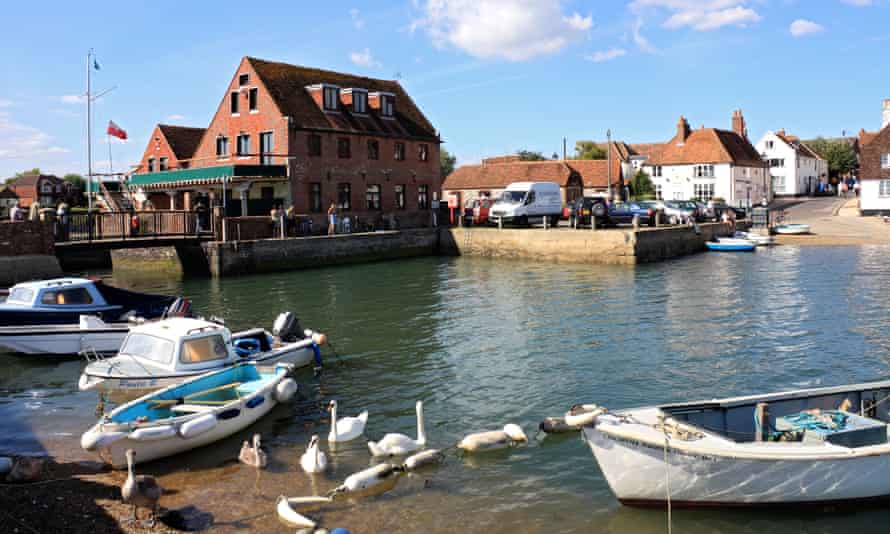Southern Water sewage is destroying protected harbour, say activists
Campaigners say Chichester harbour at risk of environmental ruin from dumping of raw sewage

Discharges of raw sewage by Southern Water into a protected natural harbour risk causing an environmental catastrophe, say campaigners.
Chichester harbour in West Sussex is one of the most highly protected marine environments in the country. But the latest analysis from Natural England shows that 80% of its protected habitats are in an unfavourable or declining condition.
Campaigners have repeatedly raised concerns over the continued dumping of raw sewage into the harbour, which is a tourist attraction and sailing and watersports hub. The leader of Chichester district council has written to the water regulator, Ofwat, urging it to hold Southern Water to account.
Southern Water was fined a record GBP90m this month for dumping billions of litres of raw sewage into waters off north Kent and on the Solent between Southampton and Chichester from 2010 and 2015. The company said afterwards that these were historical incidents and it was committed to transformation, transparency and cultural change.
But campaigners in Chichester say nothing seems to have changed. John Nelson, the chair of the Chichester Harbour Trust, said: “Bluntly, the management at Southern Water is not fit for purpose.”
Nelson said action was not being taken fast enough and the harbour was facing an environmental catastrophe. “This is one of the largest natural harbours in the UK. It is a site of special scientific interest and an area of outstanding national beauty.
“The whole harbour is in the process of being destroyed. It is important for wildlife and biodiversity, and it is important for the local economy and a real hub for sailing. And all of this is in danger as we speak.”
The main wastewater treatment works owned by Southern Water that discharge into the harbour are Thornham, Chichester and Bosham. In 2020 Thornham alone discharged raw sewage into the waters for 635 hours in 46 separate spills, according to Environment Agency data. Water companies are allowed to discharge raw sewage into waterways only after extreme weather events to relieve pressure in the system. But evidence shows the companies are spilling raw effluent much more frequently.
Chichester district council has told Ofwat that the treatment works are responsible for an “unacceptably high level of storm discharges”. Data from Chichester Harbour Conservancy suggests that in 2020 the three works spilled untreated sewage into the harbour for 168 out of 365 days.
Officials on the council say the area cannot build the thousands of homes the government requires under its target of 300,000 new homes a year nationwide by the mid-2020s, partly because of “considerable concern” over the lack of capacity at the treatment works owned by Southern Water.
Documents seen by the Guardian suggest the 10 treatment works run by Southern Water that serve the Chichester area have capacity for just 950 more homes. But the area is expected to host nearly 10,000 new homes to meet the prime minister’s promises on housebuilding.
Andrew Kerry-Bedell, from the activist group Save our Harbour Villages, said: “Everyone knows there is a problem. The government is going to have to accept in our area and probably lots of others that they are not going to be able to build the houses they want to because of the water treatment works capacity and the crumbling infrastructure.”
In communication with Ofwat, the leader of Chichester district council, Eileen Lintell, said Southern Water for years had been “deficient in carrying out their service to the public and to their stakeholders”.
The company had been slow to increase the capacity of its wastewater treatment works and was not prepared for the rising sea levels that climate change would bring, she said.
Mike Owens of the campaign group Hayling Sewage Watch said: “What we desperately need is significant and rapid investment in infrastructure to ensure that Southern Water is able to safely process all of the waste that our growing population of toilet users generate. We also need significant improvement in the regulatory functions which have failed us … the reality is pollution is still ongoing and unchecked on a massive scale.”
An Ofwat spokesperson said almost half of Southern Water’s GBP3.4bn investment over the next five years was allocated to its wastewater operations.
“It has the largest wastewater capacity increase programme of any company with funding for increasing capacity at 61 sites including Chichester. We … expect Southern Water to work closely with and listen to the local community as it continues to plan further investment and work towards resolving the issues.”
Lintell said: “Along with our partners and the MP for Chichester, we are committed to working together to improve local water quality and Chichester Harbour for the years to come. We have been raising concerns with Ofwat and have met with them; we have held a number of meetings with ministers; we’ve questioned and held Southern Water to account.”
Lintell said the treatment works were responsible for about 10% of nitrogen entering Chichester harbour, with much of it caused by runoff from surrounding farmland.
A spokesperson for Southern Water said: “We have invested heavily in improving the quality of water … including a major GBP6.5m scheme to reduce groundwater infiltration into the Chichester sewer network. Every drop of groundwater that can be kept out of the network reduces the need for storm overflows.
“This is a collective problem and no one organisation can singlehandedly improve the quality of water … We convened a summit in May with 16 local and national organisations to discuss the problem and find a solution. We’re now working with those groups on a comprehensive plan to drive real-world solutions that will make a tangible difference”